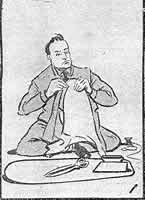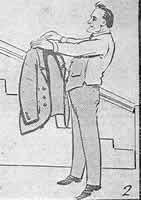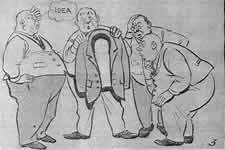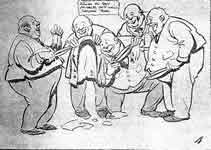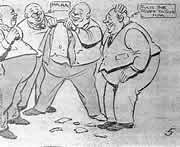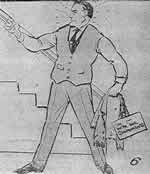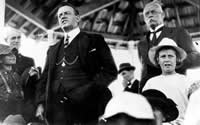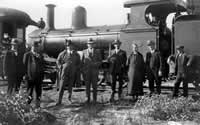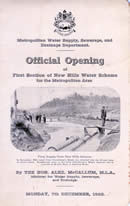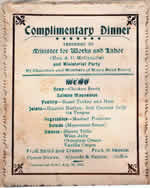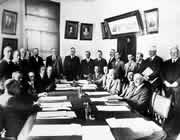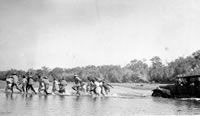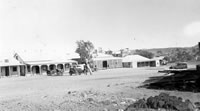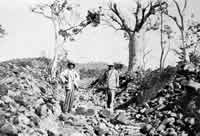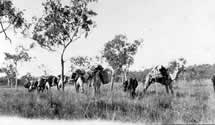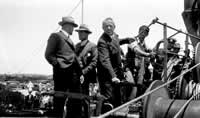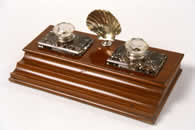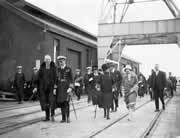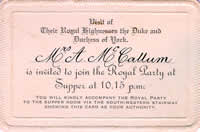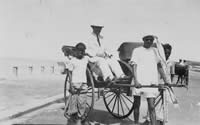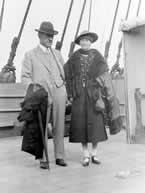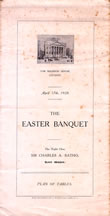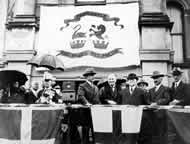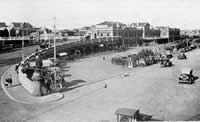
While pushing the Labor platform, McCallum resisted attempts by the State Executive of the Party to influence unduly the business of government. [1] His career as a Cabinet minister is well documented in three large leather bound volumes, mainly comprising press clippings, compiled by his ministerial staff. [2]
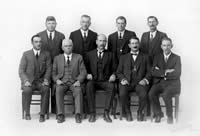
Ministers in the 1st Collier Government, 1924. Back row: Jas. Cunningham, J M Drew, S W Munsie, Jas. Hickey. Front row: Alex McCallum, W C Angwin, Philip Collier (Premier), J C Willcock, F M Troy
John Curtin Prime Ministerial Library. Records of Alex McCallum. First Collier Government, Western Australia ca 1924. JCPML00830/3

The Arbitration Act and Workers' Compensation Act - 'the two best pieces of legislation of their kind in the world'
As Minister for Labour, McCallum drew on his long experience in industrial relations and applied himself with his usual energy to improving conditions for the State's workers. He created a Department of Labour and in August 1924 he presented his plans for amendments to the Arbitration Act, presented in a two and a quarter hour marathon speech in the House:
Court of Arbitration remoulded to the heart’s desire.
President perhaps a judge.
Court to act on its own motion.
Industrial boards to be constituted and conciliation committees set up.
Industrial magistrates for enforcement orders.
Apprenticeship control board.
Forty-four hour week to be general.
A well-filled House and packed galleries greeted the Minister for Works when, in the Assembly last night, he rose to move the second reading of the Industrial Arbitration Act Amendment Bill. All were on the tiptoe of expectation to come to the pith of the measure. The exposition lacked nothing at the hands of the Minister. Mr McCallum spoke quietly and in even tones but none the less with the authority of a man who knew his subject.
Daily News, 27 August 1924 [3]
Despite a hostile Legislative Council and opposition from employer groups, McCallum achieved the amendments to the Arbitration Act in November 1925, after a delay of more than a year.The Bill provided for the appointment of a full time President of the Arbitration Court and the establishment of an Apprenticeship Board. In 1926, Sir Walter Dwyer, an Irish born lawyer who had been Member of the Legislative Assembly (MLA) for Perth from 1911 to 1914, was appointed President and the Court proceeded to effectively clear a backlog of industrial disputes.
Legislation was drafted and passed for a 44 hour week, a State basic wage award, the creation of the State Government Insurance Office and provision of increased workers’ compensation entitlements and benefits. [4] In this first term of the Collier Government, working conditions were regulated for timber workers, coal miners and others. McCallum was a strong champion of the Timber Industry Regulation Act of 1926, introduced by the first female Labor MLA, May Holman, which legislated to improve the appalling living and working conditions of men employed at timber mills, landings and yards around the State. [5]
Two statutes are monuments to his [McCallum's] capacity as a draftsman and his championship of Labor - the Arbitration Act and the Workers’ Compensation Act, described by those best able to judge as the two best pieces of legislation of their kind in the world.
'Yeomen of the Labor Guard', Westralian Worker, 30 April 1937 [6]
McCallum's struggle to get his industrial legislation through the upper house unscathed is captured in this political cartoon from the Westralian Worker of 28 November 1924. [7]
'The mutilation of the master craftsman’s industrial coat'
1. Alex McCallum: 'This coat will be the pride of Labor;
2. All I have to do now is send it to the finishing room upstairs.'
3. Chorus of sabotagers: 'The cheek of him! We'll finish it!
4. A reform coat! Cut it down! Open the stitches! To hell with him!
5. Now it can go back! It'll be useless. Haven't we made a job of it?'
6. Alex: 'You sabotagers of progress and humanity - the day is coming when there'll be done to you as you have done by those whom my coat was to warm and protect!'

1924 Seamen's dispute
A serious waterfront dispute faced the Collier Government not long into its term in December 1924. As Minister for Labour, Alex McCallum had to deal with the matter from the viewpoint of a government minister, instead of from his usual role as a union advocate. He was able to negotiate with the Fremantle Lumpers’ Union (FLU) to withdraw their support for the Federated Seamen’s Union (FSU) which was in dispute with the government, in favour of arbitration by the ALP State Disputes Committee. The bitter public dispute in the labour movement saw militant FSU President Tom Walsh and executive member George Ryce vocal in presenting the FSU case. In the melee, Westralian Worker editor John Curtin was declared black by the FSU for refusing to print a letter by Ryce. Ultimately, in early 1925, the ALP expelled the FSU and its executive, including Ryce. [8] McCallum had made more enemies, amongst them disaffected Labor MLA for East Perth, T J Hughes, 'who was unforgiving’ and aimed to 'get McCallum’. [9]
Waterside trouble. The strong man of the movement. Mr McCallum defies criticism.
One of the bright spots of the Waterside dispute has been the loyalty of the lumpers to the Minister for Works, Mr Alex McCallum. His has been a difficult role to play, for having taken an active part in Labor activities, he knew that his attitude of apparent opposition to any body of workers would lay him open not only to criticism by that body, but to possible alienation from other associations likely to combine with their companions. However, as one of the heads of the State Government he has shown himself impervious to criticism, striving to do the best for all bodies concerned.
Advertiser (Fremantle), 12 December 1924 [10]

Minister for Works - 'the hardest working man in the State’
As Minister for Public Works, Alex McCallum immediately set about reorganizing the Public Works Department. His duties kept him busy and he traveled extensively, meeting with communities and their representatives, inspecting roads, water supplies, railways and public buildings, assessing infrastructure needs, talking to labour and employers, and officiating at a wide variety of functions, often involving the completion or beginning of public works.
Margaret River Railway. Official opening. Mr McCallum optimistic.
Busselton, November 7. More than forty miles of permanent railway were officially added to the State railway system to-day, when the Busselton-Margaret River section was declared open for traffic by the Minister for Works (Mr A McCallum)…The Minister for Works expressed confidence that now a substantial start had been made with the development of the South-West, much progress and wealth would result… The Ministerial party will continue its tour tomorrow, when group settlements will be visited. They will go to Augusta on Sunday... At Busselton this morning, the Minister for Works received a deputation from the group settlers, who made requests concerning roads, drainage, implements and charges against location.
West Australian, 10 November 1924 [11]
South Beach officially opened by Minister for Works
Mr McCallum suggested that the proper way to open the Beach was by some prominent citizen taking a header into the sea from the end of the jetty, but he would follow the conventional method, that of making a formal speech. South Beach was, he said, one of the safest in Australia, essentially a children’s paradise, and should attract both residents and tourists. The question of an adequate tram service had been brought before his notice, and he gave his word that the service would be increased for the season if the demand justified.
Advertiser (Fremantle), 12 December 1924 [12]
McCallum's visit to the Piawaning-Miling district in August 1925 was typical of his ministerial journeys:
[T]he tour was one long sequence of outdoor committees, deputations, social spruiks, club corroborees, and breakfast, lunch and dinner wongies, political, social and farming. In his capacity as Minister for Works, Alex McCallum had to make speeches at and from about a score of places, including the said Chidlow’s, Clackline, Toodyay, Bolgart, Piawaning, Miling, Pithara, Berkshire Valley, Round Hill, and five at Moora. To all of these, as well as taking the initiative, Minister for Works McCallum spoke voluminously and energetically, showing a deep and wide knowledge of all of the requirements voiced.
Sunday Times, 20 August 1925 [13]
In 1925, Parliament created a Main Roads Board, consisting of a skilled administrator and two engineers and in February 1926, Alex argued Western Australia’s case at a conference of State and Federal Ministers held in Melbourne to discuss the allocation of twenty million pounds of grant funding to the States for road construction and maintenance. [14] As a result, he was able to start a big program of road construction in both country and metropolitan areas of the State.
Undoubtably, McCallum's most significant administrative work was the initiating of the big metropolitan sewerage scheme and the water supply extension scheme, which included the building of the Canning Dam. On 7 May 1926, McCallum turned the tap that supplied Perth with water from the Hills Water Supply, an event which he said:
had been very long looked for by everyone in the metropolitan area, …and for the rest of the winter at any rate the bore water would be completely shut off and only hills water would flow through the pipes. It was only a year or two since there had been an outcry against the quality and quantity of the water supplied throughout the metropolitan area.
'Fremantle Water Supply', Weekly Herald, 7 May 1926 [15]
Above left: Alex McCallum speaking at the opening South Beach in December 1924.
John Curtin Prime Ministerial Library. Records of Alex McCallum. Alex McCallum speaking at South Beach, Fremantle. Cr. J.C. Brennan and Mayor J. Cooke in background. December 1924. JCPML00830/42. Original held by Fremantle City Library Local History Collection: 118.
Above right: Alex and Bessie McCallum and others in front of a steam train on the Merredin to Narembeen railway, July 1924. McCallum officially opened the line on March 15, 1925 in the presence of a large crowd. Approximately 150,000 acres of land were served by the new line which cost £201,000. [16]
John Curtin Prime Ministerial Library. Records of Alex McCallum. Alex and Bessie McCallum and others in front of a steam locomotive, Merredin to Narembeen railway, July 1924. JCPML00830/36.
Bottom left: Programme for the official opening of the new Hills Water Scheme, 1925
John Curtin Prime Ministerial Library. Records of Alex McCallum. Programme for the official opening of the new Hills Water Scheme by The Hon. Alex McCallum, 7 December 1925. JCPML00821/5
Bottom centre: Menu for a complimentary dinner put on for Alex McCallum by the Moora Road Board, 16 August 1925
John Curtin Prime Ministerial Library. Records of Alex McCallum. Album No. 1, Hon. Alex McCallum, Minister for Public Works, Labour etc. Press Cuttings from 17 April 1924 to 16 January 1928. JCPML00835/1
Bottom right: Federal Road Board Conference, Melbourne, February 1926.
John Curtin Prime Ministerial Library. Records of Alex McCallum. Album No. 2, Hon. Alex McCallum, Minister for Public Works, Labour etc. Press Cuttings from January 1928 to April 1930. JCPML00835/2 [17]

1926 ministerial tour of the North West and Kimberley
When the Federal Government offered to take over the development of the north and north-west of the State and administer the area, the WA Government moved to dissolve the Department of the North-West, established about five years previously, and to administer the region through the appropriate departments in Perth. Alex McCallum then led a ministerial party (including the Engineer in Chief) on a tour of the regions, traveling 600 miles by rail, 3 000 by motor car, and 1 300 by boat. The journey took in Meekatharra, Nullagine, Port Hedland, Broome, Derby, Fitzroy, Halls Creek, Wyndham, Ord River Station and points between and some of the traveling was extremely arduous. Alex noted the party had 'a very strenuous time, but the trip has been very instructive.’ [18] A fascinating account of the trip is given in the diary kept by McCallum’s secretary, W Andrews [19] and a photograph album of some 100 images captures the highs and lows of the trip. [20]
July 6th (Tues)
A long and trying day. Out of bed at 5 a.m. It is strange on being awakened by the clarion call of our Lusty Lunged Nor’Wester Mr. Haley to open your eyes and see the stars and moon still shining, and to be told that dawn is coming. Didn’t believe him - sky looked the same as when we laid down - but reference to watch says 5 - so get up. Cup of tea and away at 6 a.m. Within first few miles had to cross two very bad crossings of the Margaret River - put sand belts on and all pushed.
7 a.m. arrived Margaret River Station and given an excellent breakfast by the first white cook we had seen for days. No joke 10 hungry men arriving for breakfast without notice, but the station cooks - white or not white - always rise to the occasion.
3 p.m. arrived at Moola Bulla Station and Native Settlement owned by the Government - 1,250,000 acres, carries 14,000 cattle and about 200 niggers (sic). Had an excellent lunch and saw first white woman (Mrs Woodlands - Manager’s wife) and first white baby since leaving Derby four days ago.
4-30 p.m. left Moola Bulla to start over 300 miles of the Worst Road in the World - didn’t believe it when we started but we do now (9th July) prepared to back it - in some very lengthy and frequent stretches - against any road or apology for a road anywhere.
Excerpt from personal diary kept by W L Andrew detailing tour of North West and Kimberleys, 21 June - 27 July 1926 [21]
Ever the shrewd politician, each time McCallum met with local Road Boards as he journeyed through the north-west, he arranged with the Main Roads Board to provide each local authority with an annual sum of £2000 for road improvements.
The local authorities were thunderstruck by McCallum’s generosity - but of course he did not inform them that the areas for which they were responsible earned for the State of WA, on account of the area basis allocation of portion of the petrol tax revenue raised by the Commonwealth Government, a much greater sum than the £28,000 thus allocated to fourteen North-West local authorities! The grant produced the desired result: within a few years all North-West constituencies replaced Liberal members with Labor members, hitherto unheard of in that area.
Geoffrey Drake-Brockman, The turning wheel, Patterson Brokenshea, Perth, 1960, p. 215
Above left: The ministerial party enlists help to cross the Negri River, 1926.
John Curtin Prime Ministerial Library. Records of Alex McCallum. Crossing the Negri River, 1926. JCPML00823/2/43
Above right: Marble Bar, 1926
John Curtin Prime Ministerial Library. Records of Alex McCallum. Marble Bar, 1926. JCPML00823/2/63
Bottom left: Inspecting what passed for a road - the Turkey Creek - Wyndham track, 1926.
John Curtin Prime Ministerial Library. Records of Alex McCallum. Turkey Creek - Wyndham road, 1926. JCPML00823/2/90
Bottom right: A camel train in the Kimberley, 1926
John Curtin Prime Ministerial Library. Records of Alex McCallum. A Kimberley [camel] train, 1926. JCPML00823/2/72

A second term for the hard-working minister
The Labor Party was returned in the State elections of March 1927 with a clear majority in the Legislative Assembly and Alex McCallum retained the same ministerial portfolios in this second term of the 1st Collier Government. Ministerial duties and constituency matters continued to keep Alex McCallum as busy as ever, and there was little escape for him even in his Fremantle home.
Since his occupancy of the Ministry of Works during the Depression, Mr McCallum became known to pressmen as 'the late Minister for Works’. The reason was that he rarely arrived at this office before 11am, and almost always came panting to fulfil public engagements. And the reason behind that again was that each morning 60 or 80 of his constituents gathered at his South Fremantle home to advance their various petitions, and he insisted on seeing a minimum of 50 per cent of them! A heavy burden for any man to carry, but he made its observance almost a religion.
'Banking on him', The Star (Melbourne), March 1935 [22]
Continuing his round of official duties, McCallum spoke as Minister for Works and State Trading Concerns at a ceremony in April to mark the discharging of the first bulk spirit cargo from the SS Radix at North Wharf, Fremantle.
[A]nybody of imagination could see what an important part motor vehicles were going to play in the development of the State, the Minister pointed the remark by recounting some of his experiences in a tour of the North and of other parts less distant. Only by the vigorous road policy he was engaged in carrying out would motor traction be fully developed. To wait for costly railways in new districts would mean very slow development against that to be achieved by motor traction on good roads. By the bulk handling system now introduced great economies would be effected, and he hoped that, at all events, some of the savings would go to the consumer.
'Petrol and kerosene. Bulk handling installation', West Australian, 9 April 1927 [23]
Public engagements were not all hard work however and Alex and Bessie McCallum joined other Western Australians in welcoming with a round of celebratory functions the Duke and Duchess of York who visited the State in May 1927. The McCallums attended numerous functions including the official welcome at Fremantle docks, a reception and dinner at Government House and a civic demonstration for the royal couple.
Top left: Alex McCallum at ceremony to mark the first bulk spirit cargo at Fremantle Wharf, April 1927.
John Curtin Prime Ministerial Library. Records of Alex McCallum. Alex McCallum turning on the tap at the ceremony to celebrate the discharging of the first bulk spirit cargo from the SS Radix, North Wharf, Fremantle, 8 April 1927. JCPML00830/169
Top right: Ink stand presented to Alex McCallum, inscribed 'Presented by the B.I.O. Co Ltd to Hon A McCallum MLA, Minister for Works & Labour, to commemorate the opening of the First Bulk Installation WA, North Fremantle 8.4.27'.
John Curtin Prime Ministerial Library. Records of Alex McCallum. Commemorative wooden ink stand with crystal ink wells, 1927. JCPML00839/19.
Bottom left: Alex and Bessie McCallum were in the official party at Fremantle docks to welcome the Duke and Duchess of York, May 1927.
John Curtin Prime Ministerial Library. Records of Alex McCallum. Duke and Duchess of York [Alex and Bessie McCallum in official party] at Fremantle docks, May 1927. JCPML00830/1
Bottom right: Invitation to supper with the Duke and Duchess of York, May 1927.
John Curtin Prime Ministerial Library. Records of Alex McCallum. Invitations to join the Royal Party at supper. Visit of Duke and Duchess of York, May 1927. JCPML00821/9
The pressure of work and the long hours his position demanded led to McCallum suffering another nervous breakdown in early 1928. [24] Partly as a means to recover his health, he left Western Australia in February, traveling with his wife and his secretary, W Andrew, on a world tour which took in Ceylon, India, Egypt, Europe, England, America, Canada and New Zealand, not returning until August. Andrews kept a handwritten mileage record for motor, train and water travel showing 35 360 miles for the journey. [25] In his role as Minister for State Trading Concerns and Labour, McCallum performed many official engagements during his travels and took every opportunity to actively promote investment in Western Australia. [26] While in London, he was the guest speaker at the 26th annual Western Australian Dinner at which he presented the 'latest details of the State’s phenomenal progress’. [27] On his return to Perth, the press reported:
Mr McCallum, during his absence, lost no opportunity of informing himself on matters likely to be of benefit to Western Australia. Questions of finance, and of our overseas trade in fruit and timber, had his close attention. Naturally, he devoted special study to the industrial and labour position in England and America.
'Mr McCallum’s return', West Australian, 28 August 1928 [28]
In June 1929 Fremantle celebrated becoming a city with a round of official functions and public ceremonies which McCallum attended. The round of festivities recurred just two months later when Perth celebrated its centenary with 'pride and pageantry’. [29]
Perhaps McCallum’s most creative legislation as Minister for Works was a Town Planning Act which came into force in 1928 and which grew from his 'keen sense of civic beauty…His pet project, which he sedulously fathered, was the Swan River Reclamation Scheme'. [30] Works on the Swan River were making good progress when McCallum officiated at a ceremony to mark the use of the new suction dredge Stirling in December 1929.
An act passed in 1925, the Minister said, gave the Government authority to carry on reclamation of the river foreshore to the jetty at Maylands. The mosquito-infested eyesore around the Causeway would be abolished and the foreshore would be made into garden lands that would provide one of the prettiest approaches to any capital city.
'Swan River shores', West Australian, 13 December 1929 [31]
In the 1930 State elections, Alex McCallum once again took on the duties of campaign director for the ALP:
Old hands confessed to being inspired at seeing Alex back in his old office at the Perth Trades Hall, infusing life and vigour into the fight.The election outcome, with Labor losing government, meant a change of pace for Alex McCallum.
'Alex McCallum, MLA, Campaign director', clipping from unidentified paper, early 1930 [32]
Top left: Alex McCallum in a rickshaw, 1928
John Curtin Prime Ministerial Library. Records of Alex McCallum. Alex McCallum in a rickshaw, 1928. JCPML00830/75/10
Top middle: Alex and Bessie McCallum on the deck of HMS Victory, 1928, 'The Victory. Spot where Nelson fell'
John Curtin Prime Ministerial Library. Records of Alex McCallum. Alex and Bessie McCallum on deck of HMS Victory, 1928. JCPML00830/75/12.
Top right: Lord Mayor's Easter Banquet souvenir menu, London, 1928. Alex McCallum was seated at the official table.
John Curtin Prime Ministerial Library. Records of Alex McCallum. Lord Mayor's Easter Banquet menu and seating plan. Mansion House, London, 17 April 1928. JCPML00821/15
Bottom left: Alex McCallum at the proclamation of the City of Fremantle, 3 June 1929.
John Curtin Prime Ministerial Library. Records of Alex McCallum. Hon. Alex McCallum addressing the crowd at the Proclamation of the City of Fremantle. Fremantle Town Hall, 3 June 1929. JCPML00830/40. Original held by Fremantle City Library Local History Collection: 226.
Bottom right: Central Railway Station, Perth, 1929, from Centenary of Perth souvenir booklet, 1929
John Curtin Prime Ministerial Library. Records of Alex McCallum. Souvenir of the centenary of the City of Perth 1829 - 1929. Compiled by the Town Clerk, 1929. JCPML00822/6
